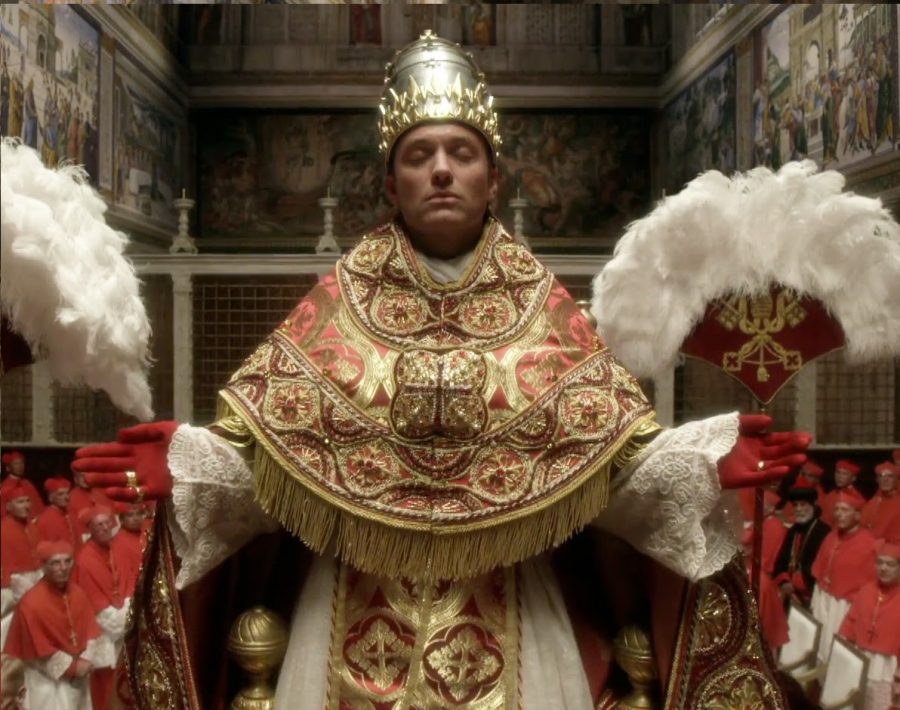The New And Young Pope
Abandoned by his hippie parents, left to mature at an orphanage under the auspice of Sister Mary (“Ma”), Lenny Belardo (Jude Law) grew to perform miracles and become the next pope, Pope Pius XIII. His papacy was unprecedented and unorthodox (in more ways than one). His story is directed by Paolo Sorrentino, who was allowed 10 episodes for The Young Pope, intended only to be a limited series, yet was given an extra 9 episodes for The New Pope, adding it on as a second season. The series is raunchy, poetic, mature, wildly unpredictable and quixotically verbose. Focusing on the characters, the interactions between them and the philosophical punches that are never pulled, there is a lack of continuity in plot and of prescience. The emotions are raw, fragile and not precluded, and one may find new ways of looking at humanity from the flaws of the people who are purported to be flawless (“The confessional is our operating room”). The show makes you think, it makes you feel and it brings you along for the ride of finding God: The show, like finding God, is philosophically discontinuous and circuitous; therefore, there is no true, logical plot.
The Young Pope follows Lenny as he finds his connection to God and to others, finding for himself the answer to “Who is God?”. In this, he asks what it means to believe in Him and what it means to love others, both as His follower and as a human being. Blackmailed by Cardinal Voiello (Silvio Orlando), the Secretary of State, into instigating a potential scandal in the Vatican, Esther (Ludivine Sagnier) attempts to seduce the Pope by getting him into a compromising position, which will be photographed by Voiello, hoping to gain leverage on the controversial Pope. Pulling back his hand, Pope Pius XIII speaks somberly, 10 minutes in episode 5, “Esther, I love God, because it’s so painful to love human beings. I love a God that never leaves me or that always leaves me. God, the absence of God . . . always reassuring and definitive. I’m a priest. I renounced my fellow man, my fellow woman, because I don’t want to suffer, because I’m incapable of withstanding the heartbreak of love, because I’m unhappy, like all priests. It would be wonderful to love you the way you want to be loved. But that’s not possible. Because I’m not a man. I’m a coward. Like all priests.” The struggle to love God is also the struggle to love others.
The season delves into the complexities in which humans constantly find themselves, interstitial to godliness and happiness. It is less a show for priests, and more a show for those anxious about their morality and the extent of their mistakes and sin. One of the most meaningful scenes of the season is one in which Pope Pius XIII describes people’s loss of unity, loss of peace and loss of feeling loved: “I’m ready to die for you, if only you will become guilty of peace. I always say to the children who write [to] me from all over the world: think about all the things you like. That is God. Children like all sorts of things, but none of them have ever written that what they like is war. Now, look at whoever is next to you. Look at them with eyes of joy and remember what Saint Augustine said: ‘If you want to see God, you have the means to do it.’ God is love. I, on the other hand, won’t speak to you about God unless there’s peace because God is peace. And peace is God. Give me peace, and I’ll give you God.”
During a speech in St. Petersburg Square, Pope Pius XIII falls ill and sinks into a coma. His predecessor, Pope Francis II, the man to whom all priests had confessed, dies of heart conditions (or does he?). In need of another pope, Voiello and others visit Sir John Brannox, an astute yet elderly intellectual of great fragility. His philosophy focuses more on the humanity of religion, of the love being shared and received: “I am a fragile, delicate man,” Brannox testifies. “True, a piece of porcelain,” Voiello capitulates. “A beautiful piece of porcelain,” Sofia Dubois (Cécile de France), the marketing director, assures. “Perhaps what you need is a man of steel,” Brannox debates. “We are the Church, Sir John. Our duty is love,” says Voiello. “Do you know what I crave?” Sir John asks, “That you would speak to me of this love.” Perhaps “Monsignor Gutierrez [Pope Pius XIII’s assistant] will speak to me of love.” Hesitativley, he proceeds, “Love is an abstract concept, but a necessary one. Like happiness, like intelligence . . . like God.” Their words are delicate, as is Sir John himself, carefully articulates and delivers: speaking through dogmas, sentences read like poems, like ethereal lullabies; for a man who has seen his brother, Adam, bleed to death and has been ostracized from his family, sequestered from their sight, Brannox speaks smoothly and competently, assured of his emotions and connection with God.
Speaking to the Cardinals, John notes that “[w]e only have one problem, I don’t know of any other. The problem is love . . . . You will come to me, and you will tell me all this suffering in the world, and I will say to you, ‘They are all hysterias of love . . . distortions of our ability to love.’ The question then is, ‘How are we to love?’ This is my way: with tenderness, without passion.” Because passion gives love concreteness, which leads to pain and suffering.
The New Pope delves deeper into the intricacies one develops through their faith and relationships. The pain, the suffering and the intangibility of it all bedevil the seeker with self-doubt and solitude; it is with Sir John that the show displays religion’s vitality and humanity, not its pomposity and egregiousness, as is the case with Pope Pius XIII. This season, though, is, too, muddled in plot, yet the characters imbibe so deeply and shine so vibrantly in every scene. However, it focuses more on the interrelations of the Church and its inhabitants: seeking identity (the nuns who go on strike, demanding respect and recognition from the Cardinals), seeking forgiveness (Sir John stands and watches as his brother dies and later publishes his manuscript as his own on The Middle Way, the religious philosophy for which Brannox was made famous), and loving one another (Voiello, every night, travels to an apartment to talk to and take care of a disabled boy named Girolamo, and, when he dies, he gives his eulogy. I can not, in words, articulate the speech, but it is nevertheless poetic, raw, human and my takeaway of the show.)The Young Pope and The New Pope deal with the hardships that come along with being human. Taking up a religion, living amongst others and falling in love are the crux of what makes it so hard to be human. So hard, in fact, that the most disciplined, the most ascetic, and the most self-conscious of us all—priests—struggle all the same.
Image courtesy of Creative Commons.






